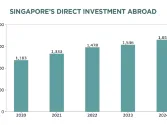
Hangzhou Finance and Investment cuts property asset dependence
S&P also forecasts HFIG’s debt-to-adjusted total equity (ATE) ratio to improve.
Hangzhou Finance and Investment Group's (HFIG) is expected to improve its leverage, supported by an 11.86% ownership transfer in Bank of Hangzhou (BoHZ) from the Hangzhou Municipal Bureau of Finance in March, according to S&P Global Ratings.
S&P also forecasts HFIG’s debt-to-adjusted total equity (ATE) ratio to improve to 1.1x-1.2x in the next two years, down from 1.6x at the end of 2023.
HFIG’s shift toward a capital-light asset management model and planned focus on digital industries aligns with Hangzhou’s strategic goals.
The transition, aimed at reducing debt-reliant investments, is expected to decrease risk but may take time to show financial benefits.
Increased dividends from BoHZ, projected to reach $69.3m to $110.8m (RMB500m to RMB800m) by 2026, will provide HFIG with stable recurring income, reducing reliance on debt investments.
The group's trust subsidiary, Hangzhou Industrial and Commercial Trust (HICT), is transitioning from loan-like products to service-type products, decreasing its dependence on property assets, now 27% of its portfolio, down from 40% to 50% in 2021-2022.
The stable outlook reflects S&P’s expectation of HFIG’s continued close ties with the Hangzhou city government, ensuring strong policy support.
($1.00 = RMB7.22)



















 Advertise
Advertise











